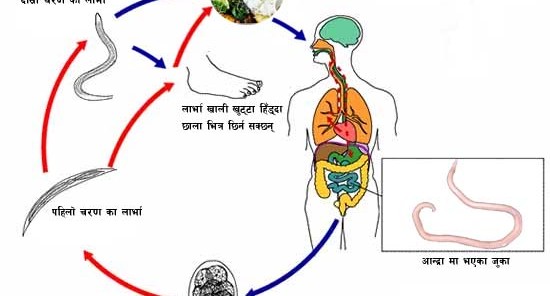Ascariasis

- Related to intestine: Abdominal pain, loss of appetite, nausea and vomiting, diarrhea, weight loss, anal itching occur in ascariasis. It is associated with growth retardation and malnutrition in children.
- Related to lungs: If the larvae migrate to lungs, you could have cough or shortness of breath.
- Intestinal obstruction: In severe cases, the group of worms blocks the bowel lumen and cause obstruction. Symptoms include abdominal pain, constipation and vomiting. Complications like gangrene, intestinal perforation might also occur.
- Related to liver and pancreas: If the larvae travel to bile duct, abdominal pain, jaundice can be seen.
- Stool test: Microscopic examination of stool may show hookworm eggs.
- Sometimes adult worms may be passed through rectum or coughed up.
- Blood tests: increase in blood count (Eosinophilia) when larva is passing through lungs.
- Imaging: X-ray, ultrasound, CT scan, ERCP depending upon the site of infestation.
- Albendazole or mebendazole are first line of treatment. A single dose of albendazole is effective in most of the cases.
- If abdominal complications like intestinal or bile duct obstruction occur, surgery or endoscopy might be needed.
- You might be asked to come for re-evaluation of stool after 2-3 months following the treatment.
- Pay special attention to personal hygiene – hand washing with soap and water.
- You should wash, peel or cook raw vegetables and fruits properly before eating.
- Avoid contact (wear shoes) with soil that may be contaminated with human feces.
- Re-infections can occur after treatment, as infection does not lead to immunity. Thus treatment of entire family and frequent administration of antihelminthic medicine may be necessary.
Ascariasis is infestation of humans intestine by roundworm (Ascaris lumbricoides). The roundworm may reside in the guts for 6 to 24 months. The eggs are passed into the stool and under warm, shady, moist conditions they can survive for up to 10 years. The infection is transmitted by ingesting food and water that is contaminated with roundworm eggs.The infection is more common worldwide; especially in warm, wet and unhygienic areas and in people who are malnourished. Although it occurs in any age group but children are more vulnerable. If one person gets infected, then it can spread to whole family.
Risk factors
The worms are present in sewage, unwashed fruits and vegetables etc. If you eat these contaminated foods, you might get a roundworm infection. Low socioeconomic status and lack of proper sanitation also increases the chance of getting roundworm infection. Travelers are also at risk of getting roundworm infestation in areas where the infection is common.
Symptoms
Most of the time, people do not have any specific symptom. When the load of worms is very high, or complications occur, then symptoms are seen. The symptoms could be:
Diagnosis
Ascariasis is diagnosed through some tests:
Treatment
Depending on the severity of the condition, Ascariasis may be treated with medication or surgery:
Prevention
There are things you can do to prevent acquiring Ascariasis. These include the following:



Send us your feedback on this article